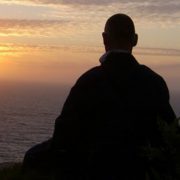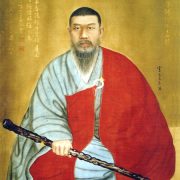Everything Becomes Buddha
We sit, looking, perceiving how the thoughts are coming, going, coming, going. This is actually all that we are doing. Our work during sitting time is to sit and watch as thoughts are coming and going. And don’t touch this; then the thought itself is Buddha.
There is no good thinking and bad thinking. There are thoughts. We don’t welcome them, but we don’t reject them. And so we sit, straight but relaxed. We just naturally watch, without manipulation, just relaxed. But the thinking, the sounds that we perceive are not that important, too. Our minds just reflect these things, but it comes and goes.
But one thing: we stay awake, aware of what is coming, what arises. And we let go, by itself. This awakening from moment to moment is very important. In this way, we can be master of our house. We don’t get controlled by others, or by our mind.
So we don’t need to keep saying, “How may I help you” All this is bullshit. This is only speech. If we, from moment to moment, awaken and be aware of what is coming, that is already a big help. So I hope we keep clear mind from moment to moment, save first ourselves from suffering, and at the same time others.
By Zen Master Gu Ja



